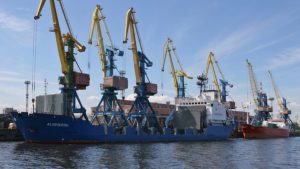
According to the results of the 60-day deadline for accepting applications for the tender for the transfer of property of state enterprise Kherson Maritime Merchant Port to concession, four companies will take part in it, two of which are international, Minister of Infrastructure Vladyslav Krykliy has said at a briefing in Kyiv. Among the companies that applied for participation in the tender are Busserk Liman Isletme Loj (Turkey), Special Company Kherson Sea Port LLC (Asket Shipping and Global Grain Consortium, Ukraine), Risoil-Kherson LLC (Petro Oil and Chemicals and AT RISOIL consortium, Georgia and Switzerland), as well as Ukrmorport LLC (Ukraine).
As reported, the government announced the start of tenders for pilot concession projects in the port industry on September 12, 2019. An agreement will be concluded with the winner of each tender, the parties to which will be the Ministry of Infrastructure, the Ukrainian Sea Ports Authority, the winner of the tender, as well as the company (SPV, the so called special purpose vehicle), which will be created and registered as the winner of the tender in Ukraine for the implementation of the project.
Feasibility studies for pilot projects were developed by a consortium of international consultants, formed by the EBRD and the IFC. In preparing the feasibility study, a systematic analysis of the market was carried out, and financial, technical, environmental and legal examinations were conducted. In addition, meetings were held with potential domestic and foreign private partners in order to take into account their proposals for the implementation of projects.
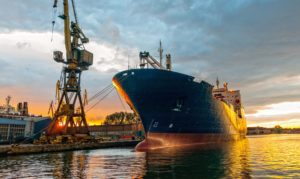
The Chornomorsk seaport (Odesa region) in January-October 2019 increased cargo handling by 23.2% year-over-year, to 21.051 million tonnes.
According to the Ukrainian Sea Ports Authority, during this period the port increased export transshipment by 24.4%, to 16.181 million tonnes, import transshipment by 15.9%, to 3.8 million tonnes, transit transshipment by 19.7%, to 881,230 tonnes, and also significantly raised transshipment of cabotage goods, almost by 3.7 times, to 179,750 tonnes.
Transshipment of liquid cargo in the port in January-October rose by 9.1%, to 1,377 tonnes, dry bulk cargo by 26.5%, to 14.42 million tonnes, packaged goods by 21.1%, to 5.253 million tonnes.
Transshipment of containers amounted to 111,279 TEU (an increase of 9%).
As reported, the volume of transshipment at the port in 2018 increased by 25.02% compared to 2017, to 21.54 million tonnes.
Chornomorsk port is a universal international port, one of the largest on the Black Sea.
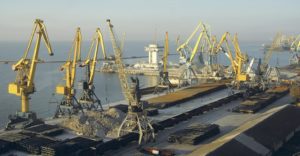
Mariupol seaport (Donetsk region) in January-October 2019 increased cargo transshipment by 5.5% compared to the same period in 2018, to 5.285 million tonnes.
According to the Ukrainian Sea Ports Authority, over this period the port increased transshipment of exported cargo by 1.8%, to 4.333 million tonnes, imported by 33.5%, to 946,480 tonnes and significantly reduced transshipment of cabotage goods, to 5,500 tonnes. At the same time, the port did not transship transit cargo.
According to the nomenclature of goods, for the ten months of 2019 Mariupol port increased transshipment of liquid cargo by 10.2 times, to 125,200 tonnes, dry cargo by 42.8%, to 1,976 tonnes and reduced the handling of packaged goods by 11.9%, to 3.184 million tonnes.
As reported, the volume of cargo transshipment in Mariupol seaport in 2018 decreased by 9.62% compared to 2017, to 5.89 million tonnes.
Mariupol seaport is one of the largest ports in Ukraine. Its capacities allow transshipment of over 17 million tonnes of cargo per year.
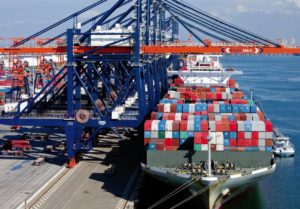
Mykolaiv seaport in January-October 2019 increased transshipment of goods by 20% compared to the same period in 2018, to 26.951 million tonnes.
According to the Ukrainian Sea Ports Authority, for the specified period the port increased transshipment of exported cargo by 27%, to 21.109 million tonnes, imported goods by 5.1%, to 5.003 million tonnes, cabotage goods by 0.2%, to 838,010 tonnes. Transshipment of transit cargo in January-October 2019 was not carried out.
In January-October, transshipment of liquid cargo in the seaport decreased by 6.3%, to 2.228 million tonnes, dry bulk cargo increased by 24.2%, to 22.044 million tonnes, and packaged goods by 15%, to 2.679 million tonnes.
As reported, Mykolaiv seaport in 2018 raised transshipment of goods by 24.09% compared to 2017, to 29.2 million tonnes.
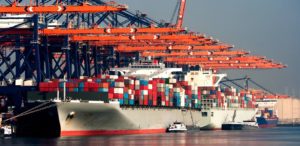
Pivdenny seaport (Odesa region), the largest seaport in Ukraine in terms of transshipment volume, increased cargo transshipment by 28.4% in January-September 2019 compared to the same period in 2018, to 38.658 million tonnes.
According to information from the Ukrainian Sea Ports Authority, for the specified period the port increased transshipment of exported cargo by 36.4%, to 28.304 million tonnes, imported freight by 6%, to 5.292 million tonnes, transit by 19.1%, to 5.043 million tonnes.
In January-September, the seaport handled only 12% of the volume of cabotage cargo compared to the same period in 2018, which amounted to 17,450 tonnes.
According to the nomenclature of cargo, in January-September the port raised transshipment of liquid cargo by 10.3%, to 3.265 million tonnes, dry bulk cargo by 34.8%, to 32.285 million tonnes, and reduced transshipment of packaged goods by 2.9%, to 3.107 million tonnes.
Container transshipment amounted to 144,985 TEU (an increase of 87.8% compared to the same period in 2018).
As reported, in 2018 the port increased transshipment of goods by 1.92% compared to 2017, to 42.702 million tonnes.
Pivdenny port was founded in 1978. It is located on the Adzhalyk firth and is the deepest harbor in Ukraine. The length of its berths is around 2.6 kilometers.
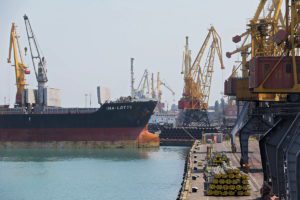
The Odesa seaport in January-September 2019 handled 18.152 million tonnes of cargo, which is 17.5% more than a year ago.
According to the Ukrainian Sea Ports Authority, over the period the port increased handling of exported cargo by 20%, to 13.375 million tonnes and imported cargo – by 12.7%, to 3.669 million tonnes, and coastal cargo 3.3 times, to 172,300 tonnes. Transit cargo transshipment fell by 6.2%, to 934,100 tonnes.
According to the types of cargo, the port in January-September 2019 increased the transshipment of liquid cargo by 16.7%, to 1.262 million tonnes, increased the transshipment of dry bulk cargo by 27.6%, to 7.51 million tonnes, and increased the transshipment of packaged goods by 10.6%, to 9.379 million tonnes.
Container handling amounted to 470,857 TEU (a rise of 10.8% year-over-year).
Odesa port is located on an area of 109.5 hectares.
The port accepts vessels with lengths of up to 270 meters and maximum draughts of 13 meters. The total length of the port’s berths exceeds 8 kilometers.